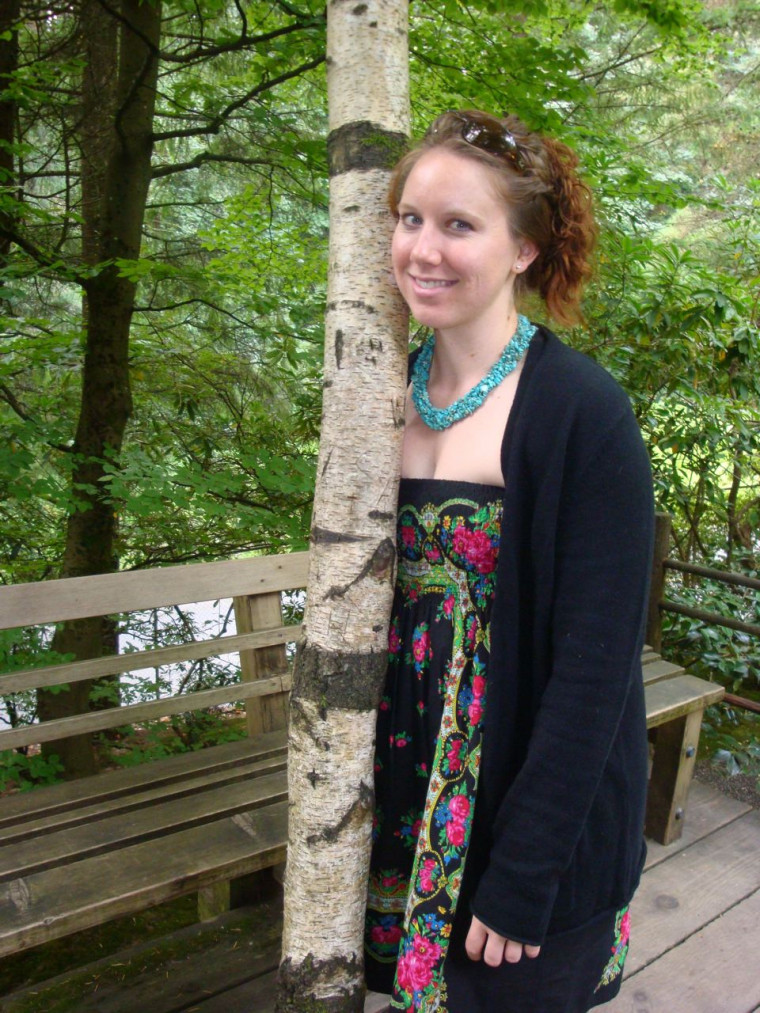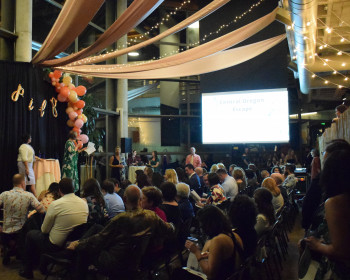Heather Joy
2011
Open gallery

High Desert and Hopi
You hit the I-40 going east, straight into the smeared golden blaze of sun rising over the far, flat horizon. The farther you travel, the less there is, until you hang a left onto the 87, right after Winslow, Arizona. It looks like half the western movies you’ve ever seen – high desert sage rolling out uninterrupted before you, craggy mesas a hazy purple far to the north. Welcome to the res.
The Navajo reservation is the big chief out here, almost 30,000 square miles of land over northeastern Arizona, southern Utah, and eastern New Mexico. It is an area larger than some U.S. states, and one of the least populated. Tucked into the middle of this massive nation, like the hole in a donut, is the 2,500 square miles and 8,500 people that make up Hopi. Your cell phone probably won’t work, but as long as you filled your tank before leaving Winslow you’ll be okay.
***
The first time I see the t-shirt I snort with laughter heavily tainted by frustration. “Don’t worry, be Hopi.” I’m Pahann manna, white girl. I’m low on gas, I’m lost, and I’m without cell phone reception. It’s been seven hours since I left my familiar mountain town for Hopi, and the directions from my host consisted of one sentence: “When you get to the 264, stop at the post office and call me.”
The post office is nowhere to be found. There is an abandoned building to my right. The sign in front of me points east and west – Tuba City, or Window Rock. With a sigh I turn west onto the 264, and start climbing the mesa, hoping the post office is on top somewhere.
It’s not. But I find the Hopi Cultural Center, which houses a restaurant, a museum, and the only hotel for 90 miles. I get directions from the lady in the funny t-shirt to the post office in K-town. At that point, there was no way I could pronounce the actual name of the village – Kykotsmovi. I wind down the other side of the mesa, slowly, cautious of the blind turns. It’s getting dark as I make it to K-town, a shabby collection of old dusty buildings. I find a post office and there is a woman exiting the building, early thirties, slim, long dark hair I will get used to seeing eventually, on both men and women. She corrects my directions, and I retrace the miles back to where I turned on the 264. There, the post office. It is the abandoned building.
The payphone doesn’t work. Another nice lady, this one short and rounded, wearing an apron, but with the same long black hair lets me borrow her phone. AT&T costs a ton, she tells me, but you get service almost everywhere. I punch the numbers for my host, and when the scratchy reception gives way to her voice I feel a rush of relief. She’s still in Flagstaff, she tells me, wait at the Cultural Center. For tourists, Pahannas, it’s the best landmark for miles. I eat a salad while I wait, pace the parking lot, vainly searching for service. Two hours later a red F-350 rolls into the parking lot and honks. She waves and I quickly start my car and follow her home.
Home is a village I’d passed several times – Shungopovi. I learn how to pronounce it later that week, but that evening I drop my bags on my bed, exhausted. It is probably the nicest house in the village, and I’m grateful for running water and indoor plumbing. The wind screams against the walls, nothing on the high desert to ease the press of air blowing from the west. Finally the rhythmic inconsistency lulls me to sleep.
***
It took me several weeks to get comfortable. Everyone was kind, smiling, and their sentences sounded odd to my ears. Work was fascinating – I ran into a real-life jurisdiction problem on the first day. They call it Indian law, the strange mash of federal, state, and tribal law that molds the courts on the reservation. There is one trial court here, and one appellate court. There are no felonies, the police are federal, and on Hopi in order to get a divorce the petitioner must first notify their village. The village, one of thirteen, may be governed by a board, by a kikmongwi, or by nothing at all. They have 20 days to assert jurisdiction or it is automatically waived.
You do not have to be an attorney to practice law on Hopi. Whatever you are though, you need a thorough knowledge of the Hopi Constitution, by-laws, and ordinances. In addition, there are few cases you can try competently without a solid background knowledge of culture and tradition. With permission, I sat in on a juvenile detention hearing and listened to an advocate argue passionately for the teenager’s release – she spoke forcefully of the great weight of commitment the boy had undertaken to participate in the upcoming katsina dance, and of the dishonor and hardship his absence would bring on his family. Even having grown up in Hopi, she still had to call on the bailiff to contribute expert testimony because, as a woman, her knowledge of the requirements placed on the male dancers was limited.
Divorce and paternity proceedings, the cases I spent the most hours working on, were fraught with jurisdiction and tradition issues. Were both parties Hopi? Was the child? Where did they live? Could this court exert jurisdiction? If so, notice and copies of the petition must first be sent to the correct village, and the certificate filed with the court. If jurisdiction was appropriate, then the wife was, by tradition, entitled to the house. She was also entitled to “in-kind” support, but not specifically to any cash payments. Of course, before drafting anything I had to carefully review all the documents she submitted to me to pinpoint her real name.
Name changes are frequent. And informal. The decision and implementation can be meaningful or random, but either way it complicates matter. For example, Mary Honeyestewa has a Hopi marriage and changes her name to Namoki, but then after informally separating from her husband three years later begins using the last name Lomayesva, which has somehow ended up on her driver’s license. Which is all the more astonishing, because her birth certificate (if one can be found), names her Mary Lomahongva Honahnie.
Law feels like it is less often followed here, than it is simply made. There are no ready answers, there are few appellate cases, and there is no Lexis. Slowly, I begin to relax into the routine.
Clients hitchhike to our wobbly trailer, parked for years now behind the blue-roofed court and jail buildings. Often they come more than 60 miles, and more than once we’ve picked someone up on the way to work in the morning who was coming there anyway. Many interviews are done over the phone, and pro se packets abound. I can recite the petition for establishment of legal parentage and child support in my sleep. I get used to sitting in interviews where the client will switch from English to Hopi and back again in a single sentence. A few words start to sound familiar, and I can say good morning - Nuh kwong dah long va’ – without embarrassing myself.
Long walks around the mesas listening to my host share stories and traditions help me ease into this beautiful culture. It helped, I think, that I already loved the desert where they made their home. The everyday manner, the ease with which people interacted, even amidst conversations about their impending divorce, made me rethink that t-shirt – “Don’t Worry, Be Hopi.” It seemed less like a laughing matter, and more like a lifestyle.
The thing I could not get used to, still cannot, is the widespread debilitating effects of alcohol. Because we shared an office with the Public Defender, where my desk was wedged with the filing cabinets between their attorney and an advocate, I saw it or heard it everyday. It was almost a joke, but one that rang hollow. Every charge seemed to float in the office trailing an additional Intoxication, or Possession of Alcohol. The acronyms and abbreviations rang through the office until they began to sound like a chant – of despair, or apathy, I’m not sure. AnB and Intox. BnE, theft, and POA. Assault, Intox and Resisting Arrest. It was almost a shock when one of their clients did not have an alcohol-related charge.
The reservation is dry, or supposed to be. But the jail is always full, and there is a road near First Mesa they call the Road of Green Glass. Almost every woman who comes in for a divorce lists domestic violence on her intake form. And having heard the stories, a believably high percentage of those DV incidences occur amidst a drunken tear. One wonders, standing among the poverty, where the money comes from to buy the alcohol.
***
I spent ten weeks in the fourth world. Learned to say my village name, to let the unique Hopi last names roll off my tongue, and not stumble when I asked what clan a person was born to. I ate pikki bread which tasted of ash and tradition, knelt at the springs of Second Mesa, passed respectfully by the shrines filled with prayer feathers. I looked into the faces of people who needed help, and saw the same gratitude I have seen elsewhere, on different faces, of different colors.
The law became more real this summer. Real in the woman who needed child support to feed and house her children. Real in the man denied social security disability. Real in the quest to prove jurisdiction was proper.
I will never be able to consider problems of jurisdiction without thinking of Hopi. Of all the things that prove, when you are on Hopi, you are in another place – of corn, of katsinas, of clan. My gratitude to my host, my co-workers, my nonprofit employer DNA People’s Legal Services.
Askwali.
More Public Interest Law Project (PILP) Stories
Public Interest Law Project (PILP) is located in McCarty Classroom Complex.
MSC: 51
email pilp@lclark.edu
voice 503-768-6782
fax 503-768-6729
President: Natalie Hollabaugh
Auction Directors: Faith Fox & Hanah Morin


